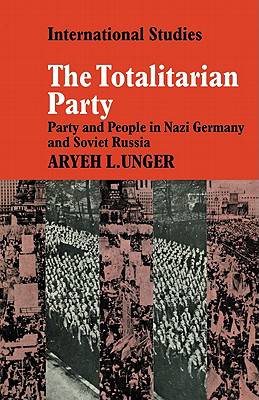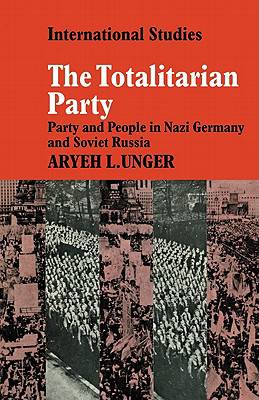
- Afhalen na 1 uur in een winkel met voorraad
- Gratis thuislevering in België vanaf € 30
- Ruim aanbod met 7 miljoen producten
- Afhalen na 1 uur in een winkel met voorraad
- Gratis thuislevering in België vanaf € 30
- Ruim aanbod met 7 miljoen producten
Zoeken
€ 60,95
+ 121 punten
Omschrijving
Originally published in 1974, this book deals with the role of the totalitarian party in relation to the people under its rule. Drawing upon a wide range of published and unpublished sources from the two foremost examples of totalitarian government in the twentieth century, the book examines the specific contribution of the party to the control and mobilization of people under totalitarianism of the 'Right' and 'Left'. Dr Unger begins by setting out the doctrinal assumptions that shaped and legitimated the attitudes of the Nazi and Soviet parties to the broad mass of the people. Against this background he then traces the Nazi and Soviet approaches to propaganda and organization and describes and analyses the interaction of these two primary ingredients of totalitarian 'voluntary compulsion' in the realms of political agitation, leisure and ritual and social welfare. Although the importance of the party as a principal instrument of totalitarian government was widely recognized, this was the first comparative study of the functions of such parties in an area in which totalitarian regimes impinge directly upon the lives of their subjects.
Specificaties
Betrokkenen
- Auteur(s):
- Uitgeverij:
Inhoud
- Aantal bladzijden:
- 300
- Taal:
- Engels
- Reeks:
Eigenschappen
- Productcode (EAN):
- 9780521134446
- Verschijningsdatum:
- 11/03/2010
- Uitvoering:
- Paperback
- Formaat:
- Trade paperback (VS)
- Afmetingen:
- 140 mm x 216 mm
- Gewicht:
- 381 g

Alleen bij Standaard Boekhandel
+ 121 punten op je klantenkaart van Standaard Boekhandel
Beoordelingen
We publiceren alleen reviews die voldoen aan de voorwaarden voor reviews. Bekijk onze voorwaarden voor reviews.











